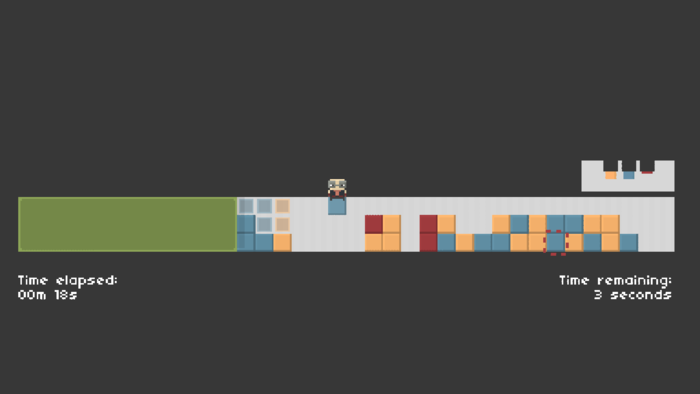Exe0.2 Michelle Westerlaken
Loading - A Speculative Game on What It's Like to be a Simulation
A tiny playful experiment about the experiential qualities of a loading bar worker. Because loading bars are people too!
Abstract
Virtual worlds are inherently about exploring alternative presents and potential futures. In thinking about alternative scenarios, the design of virtual worlds (including games) could be framed as speculative game design (Coulton, Burnett, Gradinar, 2016). These kind of virtual worlds are created with the purpose of materialising thought experiments and they could allow the player to interactively experience so called 'what if' questions that are proposed by the designers. Ideally, these thought experiments allow players and designers to engage in plausible discussions that could reshape our world-views. The prototype presented here provides a tiny contribution to this topic.
The game 'Loading', developed by Alex Camilleri, Matteo Ferrara, and Michelle Westerlaken, speculates on an alternative present in which loading bars are manually operated by an anthropomorphised creature that moves the required data into the correct place to fill up the loading bar.
Inspired by Bogost's reading on Alien Phenomenology (or, what is it like to be a thing?) (Bogost, 2012), we wanted to speculate on the unlikely, but remarkably attractive, possibility that, while watching a loading bar fill up the screen (an activity we are all familiar with in our data-driven society), the virtual world that gets executed behind the visual representation of a loading bar, consists of an oppressed worker that tries to (re)combine the required data as quickly as possible.
What if we could take for granted that all things, human an nonhuman, interact with and perceive one another? Through his description of an object-oriented ontology Bogost aims to puts things at the centre of being - a mode of thought in which nothing exists any more or less than anything else, in which humans are not the sole or even primary elements of interest. In this approach towards understanding the experience of things, we have to withdraw from human comprehension, because it becomes impossible for us to imagine what it is like to be an AI, or an executing piece of software. According to Bogost, the experience can only become accessible through speculative thought based on metaphor, which is what we aimed to experiment with in this little game.
Even though this project results in a small - mildly entertaining - piece of software that does nothing more than providing a mere fictional scenario, it does materialise new philosophical questions regarding the experiential qualities of an AI that both challenge and evoke human centred thinking. As argued by Gualeni in his book Virtual Worlds as Philosophical Tools (how to philosophize with a digital hammer?) (Gualeni, 2015), 'by materialising philosophical perspectives, concepts, hypotheses, and thought, virtual worlds are influential in contributing to the rise of a new humanism and of new ways to pursue philosophical enquiry. (...) On these premises, it is foreseeable that - facilitated by an increase in computer literacy, the growing accessibility of videogame development tools, and the progressive diffusion of digital media in social practices - more philosophical questions will arise and be confronted specifically within virtual worlds.' (Gualeni, 2015, p. 88).
I think it is the critical and embodied practice of both designing speculative virtual world experiments as well as playing them that could help us to rethink current practices, challenge world-views, and move beyond human centred thinking.
(I still plan to expand this text with some inspiration from readings within this course)
Link to the downloadable version of the game (Windows only)
http://globalgamejam.org/2016/games/loading
Link to game trailer: https://www.youtube.com/embed/pLgqJC0y3yc
References
Bogost, I. (2012). Alien Phenomenology. Or What It's Like to be a Thing. Minneapolis, MN: University of Minnesota Press.
Coulton, P., Burnett, D., and Gradinar, A. (2016). Games as speculative design: Allowing players to consider alternate presents and plausible futures. Proceedings of the 2016 Design Research Society 50th Anniversary Conference, 27-30 June 2016, Brighton, UK. Available at http://eprints.lancs.ac.uk/78561/1/DRS2016_Speculative_Games_Final.pdf
Gualeni, S. (2015). Virtual Worlds as Philosophical Tools. How to Philosophize with a Digital Hammer. New York, NY: Palgrave Macmillan.

